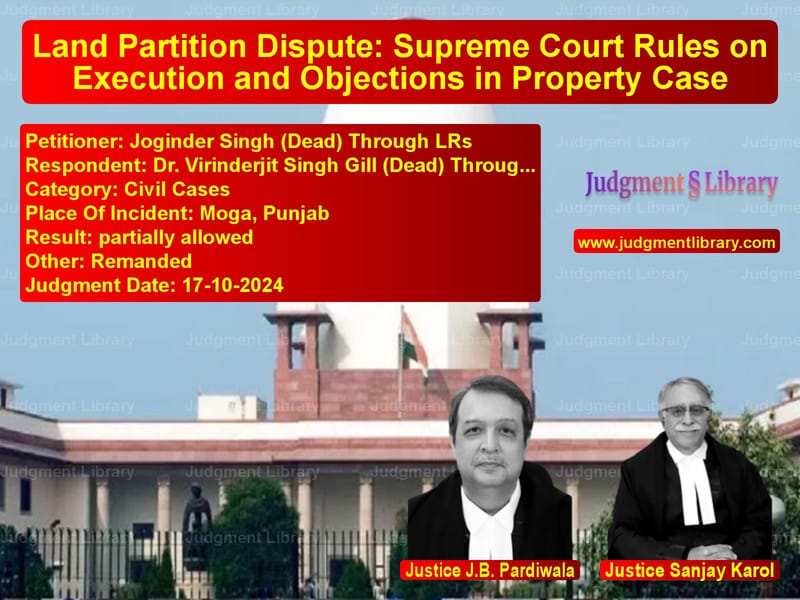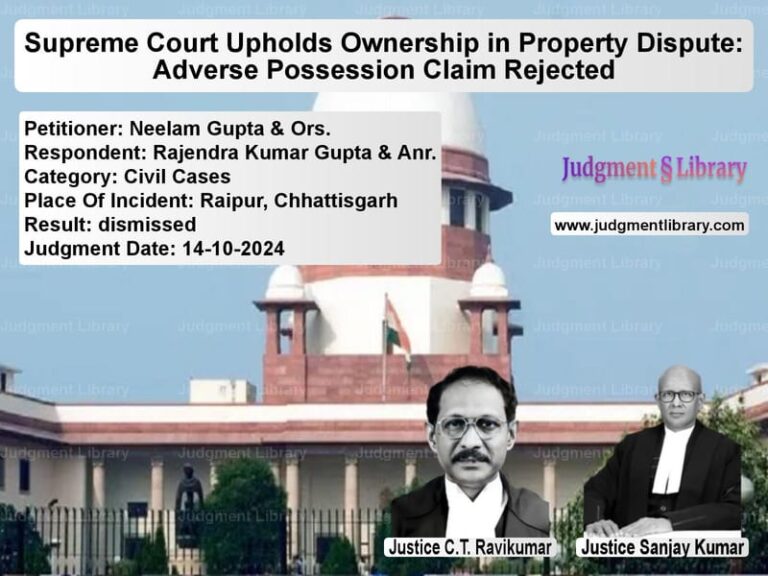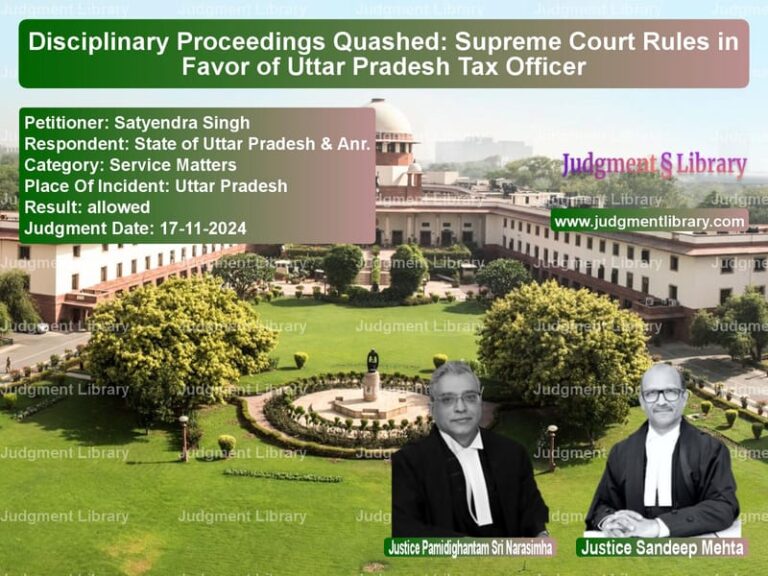Land Partition Dispute: Supreme Court Rules on Execution and Objections in Property Case
The long-standing legal battle over land partition and execution of decrees reached the Supreme Court in the case of Joginder Singh (Dead) Through LRs vs. Dr. Virinderjit Singh Gill (Dead) Through LRs & Others. This case centered around a dispute over property division and the execution of decrees that spanned multiple decades and judicial proceedings.
The Supreme Court was called upon to determine whether the objections raised by the appellant regarding the execution of a decree were legally sustainable. The case involved complex issues of procedural law, partition rights, and the principles governing the execution of decrees.
Background of the Dispute
The case has its origins in Civil Suit No. 66 of 1979, filed by Mukand Singh and Chanan Singh against multiple defendants, seeking a declaration of ownership and possession of half of a property, which included Khasra No. 2259 (measuring 2 Kanals – 18 Marlas). The suit was decreed in favor of the plaintiffs, and they were declared owners and possessors of half the share of the property.
However, in 1987, a second partition suit (Civil Suit No. 266) was filed by Dr. Thakar Singh, seeking possession of a one-fourth share of the same property. This suit was also decreed in favor of Dr. Thakar Singh. A final decree was drawn in 1998, and the respondents, as decree-holders, sought execution of the decree.
Petitioner’s (Appellant’s) Objections
Joginder Singh (represented through legal representatives) raised several objections in the execution proceedings, arguing that:
- The execution petition included property (Khasra No. 2259) that had already been decreed in favor of the appellant’s father in the 1979 partition suit.
- The property in question had been in possession of the appellant since 1989, following a civil court decree.
- The appellant had constructed structures on the land, spending over Rs. 15 lakhs, and had rented portions to third parties.
- The decree was obtained without proper service of notice to the appellant and his father.
- The decree-holders had concealed material facts and misled the court.
Respondent’s (Decree-Holders’) Arguments
The decree-holders countered the objections, stating that:
- The appellant was bound by the decree as a legal heir and successor to his father.
- The objections were barred by lis pendens, as the appellant’s title derived from his father, who was a party to the original suit.
- The objections under Order XXI Rules 58 and 97 CPC were not maintainable.
- The appellant had no independent title over the property.
- The objections were an attempt to delay the execution process.
Key Legal Issues Considered by the Supreme Court
1. Validity of the Execution Proceedings
The Supreme Court examined whether the execution petition was maintainable despite objections raised by the appellant. The Court noted that a decree must be executed as it stands unless modified by a competent court.
2. Doctrine of Lis Pendens
The Court ruled that since the appellant’s father was a party to the earlier suit, the appellant was bound by the decree. The doctrine of lis pendens prevents successors from challenging an existing decree.
3. Procedural Objections
The Supreme Court reaffirmed that objections under Order XXI Rules 58 and 97 CPC were inapplicable since the appellant was not a third party to the proceedings.
4. Misjoinder of Property
The Court acknowledged the need to determine whether the executed decree included property already adjudicated in favor of the appellant’s predecessor. It remanded the case to the first appellate court for fresh determination.
Supreme Court’s Final Judgment
The Supreme Court set aside the High Court’s dismissal of the appellant’s objections and remanded the case for fresh consideration. The Court held that:
- The appellant’s objections were not frivolous and required determination on merit.
- The High Court had erred in dismissing the objections purely on procedural grounds.
- The matter required verification regarding the actual portion of land under dispute.
- The first appellate court must ensure that the execution decree does not override the prior decree in favor of the appellant’s father.
With these directions, the Supreme Court ensured that procedural irregularities would not defeat substantive rights.
Conclusion
This ruling highlights the importance of fairness in execution proceedings and the need to protect property rights in partition disputes. The Supreme Court’s intervention prevented a potential miscarriage of justice by remanding the case for a fair hearing on the appellant’s objections.
Petitioner Name: Joginder Singh (Dead) Through LRs.Respondent Name: Dr. Virinderjit Singh Gill (Dead) Through LRs & Others.Judgment By: Justice J.B. Pardiwala, Justice Sanjay Karol.Place Of Incident: Moga, Punjab.Judgment Date: 17-10-2024.
Don’t miss out on the full details! Download the complete judgment in PDF format below and gain valuable insights instantly!
Download Judgment: joginder-singh-(dead-vs-dr.-virinderjit-sing-supreme-court-of-india-judgment-dated-17-10-2024.pdf
Directly Download Judgment: Directly download this Judgment
See all petitions in Property Disputes
See all petitions in Specific Performance
See all petitions in Contract Disputes
See all petitions in Debt Recovery
See all petitions in Judgment by J.B. Pardiwala
See all petitions in Judgment by Sanjay Karol
See all petitions in partially allowed
See all petitions in Remanded
See all petitions in supreme court of India judgments October 2024
See all petitions in 2024 judgments
See all posts in Civil Cases Category
See all allowed petitions in Civil Cases Category
See all Dismissed petitions in Civil Cases Category
See all partially allowed petitions in Civil Cases Category







